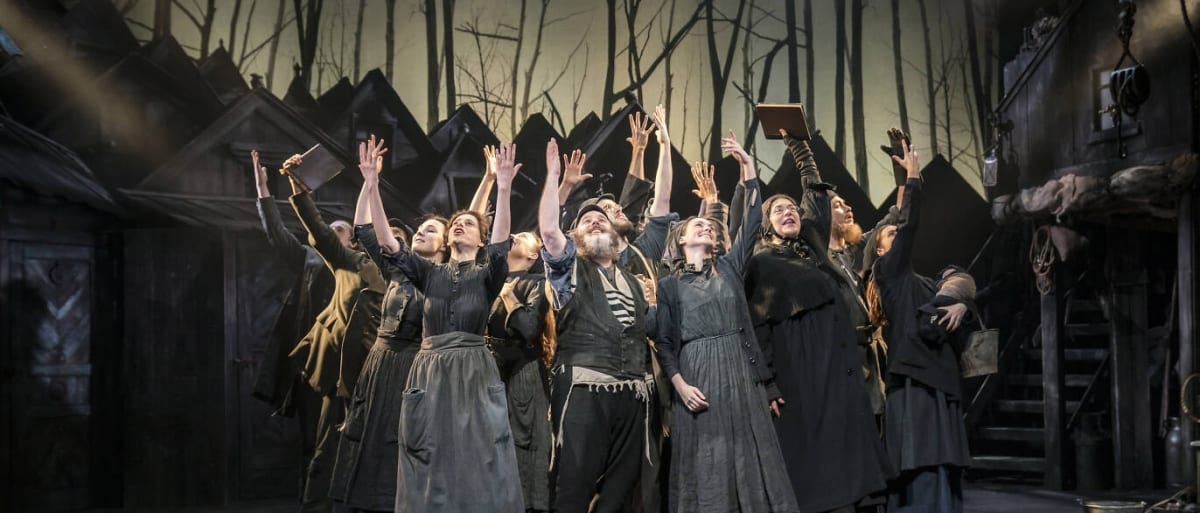The end of the 19th century and early 20th century was not the best time for Jews in Eastern Europe. Most of the Jewish communities lived in small towns on a territory of Czarist Russia – a shtetl in Yiddish. In a typical shtetl, sometimes even the majority of the population would be Jewish. Poverty was everywhere. Families, still very religious, were quite big. There were continuous tension with the non-Jewish population. To make things more alarming, the Czar tried to divert the public outrage away from his regime to a scapegoat: since 1881 till the revolution in 1917 violent attacks on Jews were initiated all around Russia. The assaults were known as “pogroms”, which were accompanied with drunken mob orchestrated by the police rushing into Jewish houses, beating, raping and sometimes massacring habitants. The communism and the enlightenment were also new phenomena of the same era.
Sounds like a terrible material for a cheerful musical? However, Fiddler on the Roof successfully manages to narrate this challenging reality through a hilarious award-winning musical. Launched first in 1964 on Broadway, this play turned into one of the classics long ago. It was the origin of famous songs such as “If I Were a Rich Man” and “Tradition.” The London’s Playhouse launched its present version of the Fiddler in March 2019.
The story takes place in a small imaginary shtetl Anatevke, somewhere in the territory of today’s Ukraine in Czarist Russia. The main character is Tevye (Andy Nyman), the town’s milkman, who is struggling between his poor daily life, the traditions of the religion, and the new infiltrating influences from the big city which start to reach the shtetl. Tevye and his wife Golde (Marie Friedman) are aiming to find a good match for their five daughters. The story complicates when, time after time, Tevye is shocked by discoveries that each of his daughters develops in a different plan. Nyman plays his role well. I was impressed.
But Fiddler on the Roof is not a love story. It is a story of a generation: a society of simple people in a remote town that seeks its place in the new times. Traditions kept the community together in severe conditions as a persecuted minority for centuries. Tevye asks himself continuously how far he should go in flexing the traditions. When his oldest daughter refuses to follow the matchmaker’s rule and declares love to her childhood friend, Tevye wonders how far this “love thing” would get. The questions surface as long as the story develops. Finally, when one of Tevye’s daughters decides to marry a non-Jewish man and informs Tevye that she “does not ask for permission”, this seems too much for Tevye. Meanwhile, Yente the matchmaker (Anita Dobson) makes plans for the whole town, Perchik the communist student from the city (Stewart Clarke) preaches about equality and social justice, and the police-chief apologizes for a forthcoming scheduled spontaneous pogrom because “the inspection might arrive to the town, you have to understand!”.
Indeed, perhaps what makes the Fiddler such a wonderful musical to watch is it brilliant humour.
But, the ability to laugh about absolutely everything is also the story of a generation. Some would argue that humour was the main reason why the Shtetl people could overcome the crazy reality which they lived in. Originally published as an Yiddish book “Tevye the Milkmen” by the famous Jewish humourist writer Sholem Aleichem, the musical preserves the spirit bestowed by the story’s creator. After a pogrom “occurs” during the happiest family wedding, Tevye would address the Divine: “I know that we are your chosen people, but could you once choose also somebody else?”.
Of course in Yiddish it would sound much better. However, we should commend the musical adaptation (by J. Stein) for very successful outreach to bring this generation’s story and its reality to the general audience. The Playhouse implements it in the most charming way.

